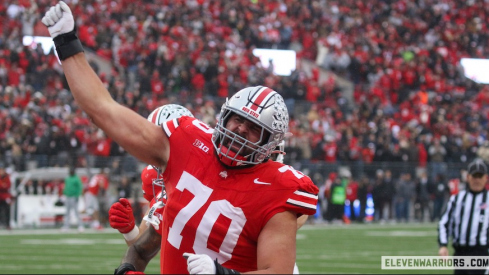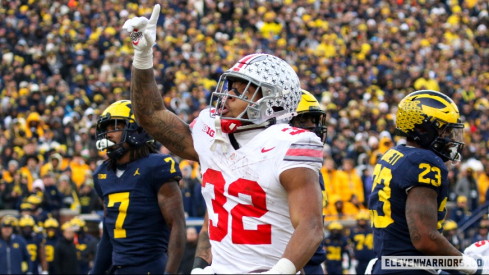One of the most overrated ideas in football is that of in-game adjustments. The concept of 'fog of war' also applies to a football game. With 22 on-field players, it is difficult for any one coach to precisely analyze what a defense is doing without film review, let alone in the heat of the moment when stress and tempers are running high.
 Our preparation Monday is more important than our
Our preparation Monday is more important than ourdecisions Saturday.
As Bill Walsh (the father of modern game planning) once remarked:
I know this, your ability to think concisely, your ability to make good judgments is much easier on Thursday night than during the heat of the game. So we prefer to make our decisions related to the game almost clinically, before the game is ever played. . .With out question you can make more objective decisions during the week as to what you would do in the game than you can spontaneously as the game is being played. To be honest with you, you are in a state of stress, sometimes you are in a state of desperation and you are asked to make very calculated decisions. It is rarely done in warfare and certainly not in football; so your decisions made during the week are the ones that make sense.
A good coaching staff's money is therefore earned through in-week game planning and preparation to avoid having to make such snap decisions. A staff that puts in the work to create a detailed game plan allows that staff to make analytical decisions after evaluating the opponent. This allows an offense to accomplish the following:
- analyze how a defense will respond to your offense's formation and plays;
- choose those plays from your playbook that will attack those defensive responses;
- map out plays for every down and distance, field position, and time situation imaginable;
- pep those plays and gain responses in practice so that your team can gain confidence in what to expect Saturday.
Good game planning should allow a staff to avoid trying to make heat-of-the moment adjustments and to instead anticipate its counters to what a defense is doing. As such, what is done in-week can have far greater impact than seat-of-the-pants decisions.
How Game Planning Works
Game planning is not coming up with a new bag of tricks for the upcoming opponent. Again, new wrinkles from game to game is overrated. Coaches increasingly realize that keeping a team's base concepts to a minimum to allow for maximum repetitions is a better guarantee of success, particularly in college football with limited practice time. Indeed, Tom Herman remarked that Ohio State fully installed their offense in six practices this fall, the same pattern Meyer has followed at previous stops.
The goal with game planning is instead to take your playbook and determine how to best apply those concepts, based upon down, distance, and your opponent's tendencies in those situations. Game planning should act like a funnel. If you have X amount of plays in your base offense, then your game plan should narrow that down dependent upon the type of defense you are facing. For example, a game plan against a defense that primarily employs cover-2 is going to feature different plays than against a primarily man defense.
The first step, then, is extensive analysis of your opponent—its defenses and tendencies by down and distance. From there, a coaching staff breaks down what plays in its repertoire will likely work best based on this information. Then the offensive staff must break this down further. Plays by formation should be broken down by down and distance: first and ten, second and long, third and three, third and short, and so on. Plays should also be divided situationally, with segments based upon field position, the two minute offense, etc.
The upshot should be that every possible situation by down and distance, time, and field position has been considered so that at the time the play is called, the coaching staff has already considered what the defense generally does in that situation and how the offense should be respond. The play caller then picks one of several plays that has already been considered for that situation. Again, in-week preparation reduces guessing and stress-based decision-making.
Urban Game planning
With this background, we can examine how Urban Meyer and his coaching staff go about this process. We are aided in this process with the insights provided by Meyer's 2004 Utah playbook. The game-planning process begins well before the actual game week, as graduate assistants will begin breaking down and charting an opponent's film by down, distance, and situations. The coaching staff will then begin analyzing that film Sunday, with the coaches then meeting with the team Monday afternoon to provide a scouting report. By this point, much of the process I outline above has been implemented. Throughout the week, this plan will be refined through coaches meetings, practice, and player interaction.
In this respect, it is particularly enlightening to examine Meyer's preparation process with his quarterbacks and the game planning process of taking your offense and applying it to that week's opponent in a strategic manner (see end of playbook). First, Meyer 'quizzes' his quarterbacks regarding critical information. The purpose of this quiz, of course, is to direct the quarterbacks' attention to critical aspects of the game plan. For instance, the coaches clearly must have noticed how Cal reacts to empty (five wide receiver) formations and came up with a plan to attack it. Similarly, the quiz discusses the plays the QBs are to check to depending on the defense presented, and situational plays such as 2-point conversions.
Next, you will see several pages dedicated to defensive looks the coaching staff expects to see against specific formations. (See here and here). Underneath each diagram are the plays the offense will run from that formation. The handwritten notes indicate the quarterback's reads when he sees that formation/blitz from the defense. Again, this is all a result of game planning. The staff has determined:
- what defenses the opponent will play against different formations;
- what coverages and blitzes to expect from those fronts;
- what plays within the playbook best respond to those defensive packages;
- how the offense should react during each play depending upon how the defense reacts.
For example, in 'Trio' formation (open trips, HB strong), the QB knows that if zone read ('14 read') is called, and the defense has one high with seven in the box he will check to rabbit hook, which is one of the checks outlined on the QB quiz. The upshot is that good game planning makes coaches' and players' jobs easier for Saturday. Saturday simply becomes implementing what you prepared for all week long.



